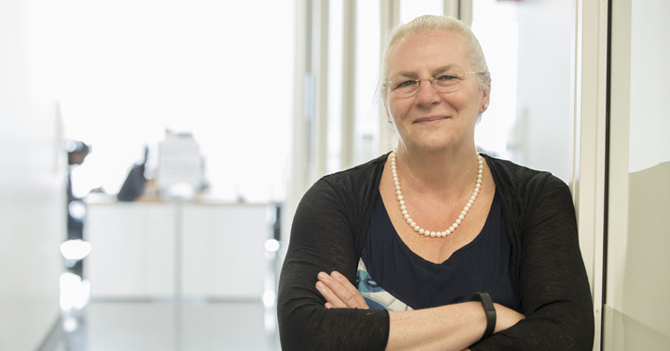 ATTENTION MEDIA:
ATTENTION MEDIA:
 MONTREAL, QUE.
MONTREAL, QUE. - Women throughout the world will benefit from a new, pan-Canadian Terry Fox Research Institute (TFRI) initiative that aims to change the way in which ovarian cancer is diagnosed and managed. TFRI and the Canadian Partnership Against Cancer are providing a total of $5-million in funding for a five-year, multi-site Ovarian Cancer Pan-Canadian Program called COEUR. The program will identify new biomarkers to predict and treat this relatively rare but deadly form of cancer, which will result in the use and application of current and new drugs more effectively for patients.
Ovarian cancer is the fifth-leading cause of cancer-related deaths in the Western world. One in every four women diagnosed with this form of cancer is resistant to standard first-line chemotherapy. Through TFRI, leading ovarian cancer researchers and clinicians across Canada have joined forces to develop a "made-in-Canada solution" to this global clinical problem facing cancer doctors.
The team's work will result in a new stratification system for ovarian carcinoma subtypes and will help clinicians better determine what treatment will work best for each patient. Patients who do not respond to standard therapy can be directed to clinical trials where new therapies are being validated.
"This project will change the way in which pathologists, physicians and clinicians think about ovarian cancer. It will help us to classify and sub-divide ovarian cancer into different diseases through molecular profiling. A better understanding of the disease will enable the development and delivery of more personalized care for the patient, which is both better and more efficacious," says TFRI President and Scientific Director Dr. Victor Ling.
"The program brings together expertise and resources from across the country to improve the lives of women in Canada and beyond who are diagnosed with ovarian cancer," says Dr. Stuart Edmonds, Director of the Research Portfolio at the Canadian Partnership Against Cancer, a national organization funded by Health Canada to lead the implementation of a co-ordinated cancer strategy. "This is one of several projects the Partnership is supporting with the practical goal of identifying emerging technologies that can improve the early detection and treatment of cancer and lead to better outcomes."
Momentum to form the consortium of 35 investigators came from within the ovarian cancer community. The project is headed up by three Canadian researchers at two prominent cancer care and research centres. At the University of Montreal Hospital Research Centre (CRCHUM*), molecular oncologist Dr. Anne-Marie Mes-Masson and gynecologist oncologist Dr. Diane Provencher are the principal investigators. Dr. David Huntsman, a genetic pathologist with the Ovarian Cancer Research Program at BC Cancer Agency and Vancouver Coastal Health, will co-lead the study from Vancouver.
"Ovarian cancer is a relatively rare disease that is also very complex. Today we know that it consists of several different subtypes; these are not yet well understood and we have significantly more work ahead to determine what treatment will work for patients and their specific tumour subtype," says Dr. Huntsman. "This program includes an important knowledge transfer component that will enable the results to be rapidly deployed within the Canadian pathology community and readily translated into practice."
"The women who are participating in this initiative by providing tissue samples for collection and analysis are hoping this research will accelerate the pace of discovery and validation of new biomarkers for ovarian cancer," says Dr. Provencher. "We hope to redirect women to new clinical trials and, in particular, those women who don't respond to first-line therapy."
"The team is building a unique, central scientific platform that will create a rich clinical resource for researchers to validate new biomarkers and treatments for ovarian cancer. By linking together laboratory scientists with the oncologists, surgeons and pathologists who work with the patients on the front lines, our work will be much more relevant and bear fruit that will reach patients much more quickly," says Dr. Mes-Masson. A strength of the program is the ability to link research results across multiple studies underway across the country.
In additional to institutional partners and investigators, other program collaborators include the Society of Gynecologic Oncology of Canada, Ovarian Cancer Canada, the Canadian Tumour Repository Network, the Canadian Pathology Study Group and the NCIC Clinical Trials Group. **
*The University of Montreal Hospital Research Centre is known officially as Centre de recherche du Centre hospitalier de l'Université de Montréal (CRCHUM).
About The Terry Fox Research Institute
Launched in October 2007, The Terry Fox Research Institute is the brainchild of The Terry Fox Foundation. TFRI seeks to improve significantly the outcomes of cancer research for the patient through a highly collaborative, team-oriented, milestone-based approach to research that will enable discoveries to translate quickly into practical solutions for cancer patients worldwide. TFRI collaborates with over 50 cancer hospitals and research organizations across Canada. TFRI headquarters are in Vancouver, BC.
www.tfri.ca
For more information, contact:
Kelly Curwin
Director, Communications and Public Affairs
Terry Fox Research Institute
Office: 604-675-8223
Cell: 778-237-8158
kcurwin@tfri.ca
Nathalie Forgue
Conseillere en communication
Direction des communications
Centre Hospitalier de l'Universite de Montreal
Telephone: 514-890-8000 poste 15262
Courriel:
nathalie.forgue.chum@ssss.gouv.qc.ca
Lisa Carver, VCH/VCH Research Institute
604 875-4111 x 61777 or 604 319-7533
lisa.carver@vch.ca
Lubna Ekramoddoullah, BC Cancer Agency
604-675-7459
lekramod@phsa.ca